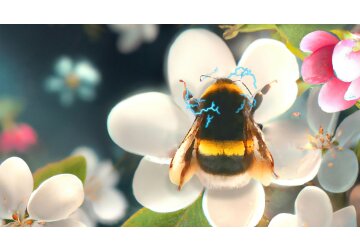
Fertilisers confuse bumblebees, making them less likely to land on flowers, study suggests
Exhaust fumes, nanoplastics and viral particles that travel through the air could potentially create the same effect, according to the researchers.
Fertilisers confuse bumblebees, making them less likely to land on flowers, study suggests
Exhaust fumes, nanoplastics and viral particles that travel through the air could potentially create the same effect, according to the researchers.
Bumblebees, which have a positive electrical charge, can detect and are attracted to the negative electrical charge in flowers.
However, synthetic chemical sprays alter these floral electrical cues, disturbing the bees' senses, according to the study published in PNAS Nexus.
While tests found that fertilisers did not change bees' ability to identify a flower through vision and smell, researchers found that when they electrically manipulated flowers to mimic the electrical changes caused by fertilisers and pesticides in the field, the bees' senses were affected.
They found that chemical sprays altered the electric field around the flowers for up to 25 minutes after application - substantially longer than natural fluctuations, such as those caused by wind.
They observed that this alteration aligned with a 20-minute change in bee feeding habits, in which bees were less likely to land on an electrically manipulated flower compared to a control flower that was not manipulated.
The study provides the "first known" example of noise made by human activity "interfering" with the electrical sense of dry land animals, said study co-author Sam England, a Biological Sciences PhD student at the University of Bristol.
''It's much like motorboat noise that hinders the ability of fish to detect their predators, or artificial light at night that confuses moths; the fertilisers are a source of noise to bees trying to detect floral electrical cues," the co-author added.
"This widens our understanding of the multifaceted ways in which human activity is negatively impacting the natural world, which can seem quite depressing, but what it will hopefully allow is to introduce or invent solutions to prevent the adverse effects that these chemicals may be having on bees."
The researchers then mimicked a rain event to see if that would reduce the effect the chemical sprays had on the flowers. However, they again observed a prolonged alteration in the flowers' electrical field from the chemical sprays.
'Implications beyond pollination'
Therefore, the long-term effects of the changes remain uncertain.
"It is conceivable that the adverse effects of spray applications can persist in time," the researchers said.
Exhaust fumes, nanoplastics and viral particles that travel through the air could potentially create the same effect, the study concluded, noting that the modifications caused by human-made chemicals carry "implications beyond pollination."
news.sky.com







